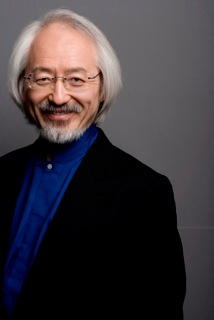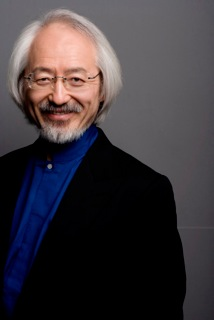
Photo by Marco Borggreve
Last June, the German city of Leipzig awarded Japanese conductor Masaaki Suzuki the prestigious Bach Medal 2012. Suzuki, an internationally renowned Bach specialist and founder of the Bach Collegium Japan (BCJ), received the medal for “significant contributions” to “the dissemination of the works of Johann Sebastian Bach in his homeland Japan through his work as organist, harpsichordist and conductor.” The jury stated that: “concerning the repertoire of Bach, which has always been much-appreciated in Japan,” Suzuki has “created an awareness for a scientifically and historically oriented performance practice in Japan and the entire Asian region.”
The inclusion of Suzuki in an impressive group of honorees (among them: Gustav Leonhardt, Nicolaus Harnoncourt, and Ton Koopman) came as a surprise to no one, yet things were different in 1995, when Suzuki released the first volume of BCJ’s complete Bach cantatas. The Swedish independent label BIS made a disc, reportedly from a single recording session. That new arrival on the international early-music scene was met with skepticism and even some latent hostility: How, listeners wondered, could someone from an ancient Eastern culture adequately comprehend Bach, the epitome of Western classical music? And the question “how dare he?!” hovered right below the surface.
“We were very surprised that they thought that Japan and Bach don’t go together,” says Suzuki. “And it is actually a complete misunderstanding. Bach’s music is a universal language that can easily overcome any kind of cultural border. He is one of the most famous European composers in Japan. Every child who starts playing the piano plays Bach at some point, and everybody who goes to a conservatory has to study Bach. Nobody is a stranger to Bach’s music.”
In an interview with Choir and Organ in 2005, Suzuki explained how the Japanese quickly developed an enormous appetite for all aspects of Western culture, especially music, once the country opened up to the West. From the early 17th century until late in the 19th, Japan was officially closed to the West, and only the Netherlands had limited access to it. After World War II, the interest in Western art music merely increased.
SFCV spoke with Masaaki Suzuki on his arrival in the Bay Area from Amsterdam, where he conducted a number of concerts with the Netherlands Radio Chamber Philharmonic and the Netherlands Radio Choir.
In a recent YouTube interview for the Early Music Festival in Utrecht, you responded in perfect Dutch. Then I remembered that, after you graduated from Tokyo University of the Arts, you went to Amsterdam to study harpsichord with Ton Koopman and organ with Piet Kee. No wonder you speak the language so well!
I studied in Amsterdam between 1979 and 1983, but during this last visit I realized that my Dutch is not really sufficient anymore [switches to excellent Dutch]. My Dutch is good enough for everyday use, but not good enough for an interview about music [laughs].
You are in San Francisco for a series of concerts with Philharmonia Baroque Orchestra, a Bach Christmas program, and two performances of Messiah. Is this your first time with Philharmonia Baroque?
Yes, this is the very first time. I have been in Berkeley twice, with my own ensemble. The first time was in 2003 with the whole group — choir and orchestra — and the second time was 2006 or 2007, with a kind of chamber ensemble. I haven’t been here since, so that is quite a long time.
You probably already know some of the musicians in Philharmonia Baroque?
Well, actually, yes, I have worked with several of them already. And all the vocal soloists are alumni from the Schola Cantorum at Yale. I picked them myself.
At Yale University, you are visiting professor of choral conducting and conductor of the Schola Cantorum. How long have you held that position?
I was there in October and this was my third year. I go there every spring and autumn for a few weeks. We do at least one big project, in addition to smaller things like chamber music and so on. Every year, we do a program together with the Juilliard Baroque Orchestra, and every other year we do an international tour. We were in Italy last year, and next year we go to Japan and Singapore. I am very thrilled about that.
Your parents were both amateur musicians, and Christians. How has your Christian background influenced your perception of Western music in general and Bach’s music in particular?
Without this background I probably wouldn’t have come to this field at all. When I was in middle school, I started playing the organ every Sunday during worship. I enjoyed it very much, and tried to play all of Bach’s organ works, but the organ was actually only a small, pedal-pumped harmonium; it was impossible to play Bach on that. So I decided that I had to play a real organ, and took lessons in high school. My first teacher was a Belgian Catholic priest who was also a musicologist, specializing in 15th- and 16th-century polyphonic music. I wouldn’t have started this without my religious background. I have always felt a familiarity with Christian music and culture, and not only the worship. I can’t say that I am very religious, but I believe in God.
I believe in the power of music, and especially in Bach’s sacred works.
I have heard you talk about the consoling, nourishing power of music.
In Japan, so many people have been hurt by disasters like tsunamis and earthquakes. They were really consoled by the music and the text translations of the Bach cantatas. Quite ironically, right before we started recording in 1995, we had a big earthquake in Kobe. Following the disaster, the chapel in which we were recording [at Kobe University] was one of the few concert venues in which you could still perform. All the other concert halls in Kobe city were either damaged or used for storage of dead bodies. We postponed the project, of course, but in the meantime we had a couple of charity concerts for the victims of the earthquake. Many people told us how the music spoke to them. I believe in the power of music, and especially in Bach’s sacred works. This kind of suffering hasn’t changed since Bach’s time. In the 18th century death was probably closer to everyday life; Bach had 20 children but only a few made it to adulthood. Death was much more normal in those days, but people’s feelings about the death of a family member or a friend haven’t changed.
Can you explain Bach’s universal appeal?
When you perform German cantatas in German, it is not easy for any kind of foreign audience. In Asian countries like Japan, even English doesn’t work so well. European languages are very difficult for our audience, but we can provide a Japanese translation to the audience members and then we get a chance to talk and think about the context of the text. Bach’s music helps a lot. Sometimes you can understand the context of a cantata without knowing the text itself, because the music is so powerful.
Sometimes you can understand the context of a cantata without knowing the text itself, because the music is so powerful.
What is your part in the appreciation of Bach in Japan?
We have given Japanese audiences the opportunity to hear live Bach performances. There are many people in Japan who have listened to LPs and CDs for a long time. I have had many reactions and letters from older people who are really fond of Bach’s music — people who have been listening to this or that recording for 50 years but still didn’t have the opportunity to experience a live, professional performance of a Bach cantata. There used to be only amateur choirs and ensembles playing this repertoire. We were the first professional ensemble to really concentrate on Bach.
How far along are you with your cantata project?
Volume 52 has just been released, and we actually have only one more project recording. Volume 54 has already been recorded, and volume 55 will be the last one of the church cantatas, which makes me a little sad. We will just keep going with the secular cantatas for a couple of years, and in between we will also do Lutheran masses. We will, of course, continue with live performances.
Can you compare your own Bach cantata project with others, such as Gustav Leonhardt and Nicolaus Harnoncourt, who in 1971 started recording the first complete cycle of Bach cantatas on period instruments?
The Harnoncourt and Leonhardt recordings were sort of my starting point. They were very important to me. For them, it was much more difficult to do the cantatas than for us; they didn’t have new Bach editions or new research and so on. They actually developed and discovered a lot of things during their projects. It actually took us the same number of years to record the cantatas — about 18 years. Of course, once you are finished, you always want to start again, but then you would need another 18 years.

